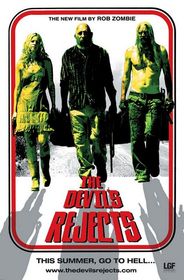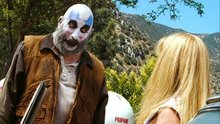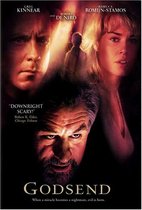Our editor-in-chief Nate Yapp is proud to have contributed to the new book Hidden Horror: A Celebration of 101 Underrated and Overlooked Fright Flicks, edited by Aaron Christensen. Another contributors include Anthony Timpone, B.J. Colangelo, Dave Alexander, Classic-Horror.com's own Robert C. Ring and John W. Bowen. Pick up a copy today from Amazon.com!
The Devil's Rejects (2005)
Creating a follow-up to the ghoulish spookshow feature House of 1000 Corpses would be a difficult job by anyone's estimation. While House is not without its own particular charms, it contains little of the depth, if you can call it that, of the 1970s grindhouse flicks it seeks to emulate. Writer/director Rob Zombie, however, has learned some lessons since the release of the first film and crafts an interesting experiment in audience sympathies. Whether that experiment is enough to satisfy the hardcore horror fan remains to be seen.
Rejects opens with Sheriff Wydell (William Forsythe) laying siege to the household of the mass-murdering Firefly clan, part of the lawman's effort to avenge the death of his brother George in House. Otis (Bill Moseley) and Baby (Sheri Moon Zombie) escape and, with errant father Captain Spaulding (Sid Haig), take their diabolical hi-jinks on the road.
Although still employing a few silly, distracting tricks such as freeze frames and lingering shots of Baby's shapely rear, Zombie directs this film with a more assured hand. Gone are the overreliances on multiple film stocks, blaring heavy metal, and cutaways to unrelated footage for "atmosphere." Zombie uses Super16 film for that grainy, low-budget look and it's surprisingly effective in transporting the movie back to horror's more visceral times. Also, whereas House takes place largely at night in a decrepit, labyrinthine house, Rejects cracks the Fireflys' claustrophobic world open and pours yellow sun all over their murderous trek across the Southern landscape.
I somewhat enjoyed the House soundtrack, but Rejects blows it away. It's filled with classic rock, each cut carefully selected to fit the mood, either directly or perversely. The Allman Brothers' "Midnight Rider" bootscoots over the opening credits, and three tracks by Brit rocker Terry Reid are put to memorable use. The real gem, however, is Lynrd Skynrd's "Free Bird," which Rejects uses in a way that's both completely unexpected and truer to the song's spirit than any other film has ever been.
Continuing his trend of hiring cult icons, Zombie stuffs Rejects the brim with recognizable faces. Moseley and Haig, obviously, reprise their roles from the previous film. Additionally, PJ Soles, Ginger Lynn Allen, Steve Railsback, Mary Woronov, and Michael Berryman all make appearances. Ken Foree has a significant role as a pimp who is also Captain Spaulding's brother (somebody explain to me how that works). Sadly, Karen Black is absent; Leslie Easterbrook takes over the role of Mother Firefly, duplicating Black's performance in House exactly.
These are all simply elements, however; what about the film as a whole? I can't answer that question easily. The film seems to exist in two halves -- one which emulates the weaker elements of House without the gruesome inventiveness, and one which asks some twisted questions of the audience, but also betrays the characters a bit to make its points.
The first half of the film, which mainly deals with Baby and Otis torturing a country-western band at a cheap motel, has its moments. The vein of deadpan gallows humor that courses throughout makes sure a grim chuckle is never far off, but it's otherwise difficult to enjoy. Sure, it's chockfull of the murder, torture, and depravity that the publicity people promise in the advertising, but so what? People we've barely met are humiliated and slaughtered with the adolescent glee of a high school freshman hur-hurring over nude women in sex ed. It's evil for the sake of evil, something that has never interested me that much.
What does interest me, however, is a person doing bad things for what they perceive to be the right reasons, which is why the second half works much better for me. Somewhere, almost imperceptibly, Wydell turns from an asinine protagonist to a worse monster than all of the Fireflys combined. Suddenly, our sympathies shift; where we were once disgusted and alarmed at the droning sadism of the killer clan, now we're rooting for their escape from this maniac.
In flipping the sides of the conflict around, Zombie tweaks the classic story of underdogs fighting an uncomprehending, corrupt authority. The fact that the "underdogs" here soak in the blood of hundreds of victims almost becomes our justification in rooting for them. No matter how barbaric Otis and Baby act (Spaulding is rarely more than a gleeful accomplice), there's a certain purity to their actions. It's their way of life, what they know. Wydell, on the other hand, believes he's delivering the justice of God, and, ironically, is capable of cruelties of which the mass murdering Fireflys never dreamed.
However, to show off these cruelties, Zombie gives us a climactic face-off that relies on the previously tough, crafty clan becoming completely incompetent. Baby, on the run from Wydell, begins exhibiting all the behaviors of the dumb blonde victim from countless slasher films. While this arguably highlights the role reversal, it also goes against pretty much everything we know about Baby from both films. Spaulding and Otis are even more useless, but they at least have good excuses (which I won't give away). Eventually, they all need rescuing by a plot device.
It should be noted that Zombie does redeem this bit of weak writing with a beautifully orchestrated finalé that exemplifies what the Fireflys stand for. If it were not for this iconic bit, which recalls The Wild Bunch, Bonnie & Clyde, and Thelma & Louise all at once, my opinion of the film might be slightly lower.
The Devil's Rejects turns the tropes of audience sympathy sideways and shoves them up the hindquarters of "morality." That's certainly worth some thought, but it only goes so far in making the film work as a piece of entertainment. While I eagerly await Zombie's next movie, he still has a ways to go before he produces a truly classic horror film.










This movie is great, too bad
This movie is great, too bad his follow up was a crap storm